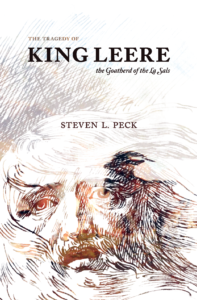 Author: Steven L. Peck
Author: Steven L. Peck
Title: The Tragedy of King Leere, Goatherd of the La Sals
BCC Press, 2019
Reviewed by Dan Call, Dec. 2019
Peck’s work came to my attention several years back when I first read the short story “Let the Mountains Tremble for Adoniha has Fallen” and later had my mind blown by his novella A Short Stay in Hell. Earlier this year, I learned of several other books he’d published, circled around which one I really wanted to read, and finally settled on this one out of a desire to balance my readings, which have tended toward the theological/historical lately.
There were a dozen or so minor errors with conventions that really bugged me as a teacher (there and their?!), but I calmed myself down, and looked past them. This is, after all, a first edition, and these tiny blemishes (of which I cannot claim innocence) do not detract from the overall text.
Peck does a magnificent job on many levels: the stage on which these characters act is fleshed out on a scale that would make any world-building writer happy. I took special note of the slivers of detail about a great schism in the LDS church, involving heretics, doctrinal interaction with technology, and divergent priorities according to geographic regions. There were hints of dueling post-America would-be hegemons (Brazil and China figure largely), painful scars borne from recent wars, realistic linguistic developments, technological innovations that disorient the reader but not the characters. These critical and fascinating details achieve just the right balance of giving depth and dimension to the characters, informing their choices and creating a realistic setting, without choking out the story.
The battle dredge was especially fascinating to me, and would make a frightening addition to any sci-fi world. I had a hard time imagining it without resorting to some old Robotech artwork. KENT continued to grow more and more interesting – could be developed into a compelling, artistic mini-series.
But the show-stealer for me was Asmodeus. His monologues alone deserve to be studied, read over pulpits, acted and re-enacted in classrooms, debated by philosophers, paraphrased, and preserved. I don’t often find myself starring and underlining text in this genre, but I just couldn’t resist. While commenting on the tragedy unfolding scene by scene, he tiredly drops wisdom on an epochal scale, and I hope to hold on to and integrate parts of his perspective with my own. Take this excerpt from Daemon’s Interlude 5: “[War] will, in the end, destroy you all, but there is nothing to be done about that. You are what you are: mid-sized and small-brained apes, that bicker and fight, screech and pound your fists on the ground when you sense some injustice that needs fixing, but in the end, you care not about injustice in the abstract, but only when it means ‘injustice against me or mine.'”
An earlier interlude by Asmodeus, “Of Ants and Archons,” paints a bleak picture of the human condition, and brought to mind the other Lear adaptation in which I am semi-versed, Akira Kurosawa’s Ran. An unlikely cinematic triumph from his late period, Ran included many shots using telescopic lenses, creating a sense of scale that often made the raging wars of Hidetora’s sons look like little more than pitiful ant skirmishes, tragic in their wasteful, senseless struggles. Through Asmodeus, Peck likewise succeeds in voicing the telescopic perspective of life on Earth, of which humanity plays only a small but over-significant role. It took me a couple of readings and a good deal of reflection to get at what he was saying with all this talk about Archons, ants, robots striving to be free, evolution of consciousness – but it felt worth it.
